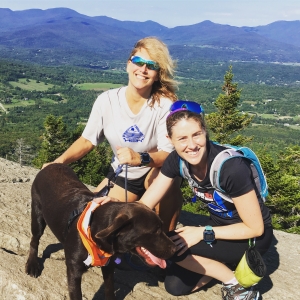What is working with a triathlon coach like? I wanted to have an athlete provide her experience training but also in working with a triathlon coach who is qualified and has her best interests in mind. Coaching comes in many forms and finding the right match is key…but don’t take it from me.
Liz Manfredi gave us all the details of her training experience in part 1. Now, here is her interview on coaching. This was done via email with Liz’s responses uncensored and uncut.
Hey, I would not have shared some of this from my perspective, particularly the “funny” parts but I have never liked it when coaches insist on filters and guided responses. Some answers had me teary eyed with the great memories. Other “Liz insights” made me gasp, “Oh! Did I say/do that? I should have been more proper,” but we had a blast and she saw success so it is all good! Here is the story of being coached from Liz’s lens.
What made you decide to hire a coach for this journey?
A few reasons: Pushing 50-years-old, I wasn’t a spring chick any more. And, I have a crazy busy life including a full-time job, an adult son with special needs, a mother with a terminal illness, many friends and a partner. I knew that training for a monumental event this like was going to require smart and efficient planning and training. But more importantly, I was tired of constantly being sidelined with injuries, only to have to start all over again. And while the online training plans were fine to a certain extent, they didn’t consider my individuals needs or help me to navigate through periods of injury, setbacks, or discouragement.
How did coaching differ from what you expected? What was the most unexpected aspect of being coached for Ironman?
I thought it would be a process of data in…data out. I imagined it would look something like this: identify goals, receive written work- out assignments, do the workouts, enter my requisite training notes, get feedback on objective data and suggestions for improving performance, race, get more feedback on performance, new drills to improve performance, etc… I expected a very depersonalized coaching relationship driven by data and performance outcomes.
Based on a prior coaching experience, I didn’t think my individual needs and circumstances would be taken into consideration.
I sure as hell didn’t expect to be taken seriously as an athlete given my age, physical condition, body composition (a little porky) and back-of-the-pack performance. Speaking exclusively about my experience as a coached athlete at Ever Racing…Wow! Was I in for a surprise!
The first thing that struck me when meeting Coach Kelly for the first time was that she didn’t laugh at me when I said I wanted to complete an Ironman within a year, then qualify for Kona in five years. Say, what?!?! Even I laughed at me when the thought crept into my consciousness.
Also, I was completely surprised by the depth and breadth of the coaching relationship that supported our work together. It was, and continues to be, a relationship that was authentic and meaningful, and it completely shattered my pre-conceived notions about depersonalized coaching.
How did having a triathlon coach help you?
Coach Kelly helped me meet my performance goals by developing creative training plans that accommodated my unique needs, minimized my risk for injuries, and got me back on my feet and race ready after periods of illness or injury. She helped me navigate the set backs and get through the emotional crap that can creep in when you are hurt, sick and discouraged.
Her brutal honesty, passion, and willingness to selectively share her own raw vulnerability nourished my passion and inspired me to work hard to be the best athlete I could possibly be.
When necessary, she pushed me to“shit or get off the pot”; reminded me about what is important when I lost sight; helped shatter my self-limiting beliefs; made me laugh; helped me keep it all in perspective; to not take myself too seriously. She believed in me, even when I was not so sure.
Above all else, she was authentic. She called it like it was. In her own words, she was not a candy maker and didn’t sugarcoat anything. If I was not towing the line, I heard a about it. She was tough at times, but equally compassionate. She didn’t just spew rhetoric, she lived by her words and beliefs. She led by example. I never had to second guess her, or her intentions. When she said she cared about my goals, or was equally invested in my success as an athlete, every fiber of my being knew this to be true.
The manner in which she supported my journey is important because it allowed for the development of real trust. Trust is not something I give freely or easily. She is among a handful of those I whole heartedly trust. Because that trust exists, I will be able to continue to grow as an athlete.
Sometimes, it’s the seemingly insignificant gestures or acts that have the greatest impact on people. Here are but a few humorous ones from this training journey:
- Early on, I stopped training and dropped out of communication with Coach for reasons I can’t recall. Did I receive a scathing email blasting me for being an irresponsible athlete, not meeting the expectations for a successful athlete/coaching relationship? Nope! Instead, I received a milk carton with my picture on it and a caption that read, “Have you seen Liz?” Hysterical!
- Following a long run, I informed Coach that I was pretty sure my left leg was stronger than my right. Without skipping a beat she replied, “OK. Tomorrow I want you to run for twenty minutes just on your right leg.”
- Feeling completely stressed and freaked out as taper approached I whined, “But I don’t WANTto taper.” Response: “OK. Let’s have you run 26.2 miles every day between now and Ironman.”
- When my stress reached a level that threatened to bring me to my knees, Coach instructed me to meditate. What?!?! No bleeping way! …
…She insisted, and even sent me a guided meditation she wanted me to listen to. The thought of listening to a guided meditation made me want to pound my head against the wall. Then she informed me I could listen to it on my commute to work and instructed me to “report back” when finished. I cursed all the way to the car, and starting mentally reviewing all of the literature I was going to send her when I got to the office to dubunk the efficacy of stupid meditation. I would not have turned that video on for anyone else; I would have told them precisely where to put their guided meditation.
But, I tuned it on. New age, angelic music poured from my speakers. I rolled my eyes and the guide began: “…take in a deep breath…now breath out bullshit. Just feel the f*cking nonsense float away….If your thoughts drift to the three-ring shit-show of your life, bring your attention back to your breathing. And with each breath, feel your body saying, ‘F*ck that…”
Well, I laughed like I haven’t laughed in years. Tears were pouring down my face and I had to pull of the road. Major stress buster!
Do you think it’s necessary to have a coach in order to finish an Ironman?
No. I think there are athletes who can successfully complete an Ironman using a generic training plan. There are a lot of plans out there to help prepare people for the physical demands of the training and race. But having a coach, a good coach, provides so much more. Personally, I’m not sure I would have made it to the starting line without my coach, let alone finish the race.
What advice would you give to someone who wants to finish an Ironman?
“The journey of a thousand miles begins with one step.” – Lao Tzu
Be brave. Take a risk. Take that first step. It doesn’t matter how old, slow or broken you think you are. Or, if you don’t look or feel like a “real athlete”. Speed, youth and athleticism does not carry you through the training journey and across that finish line on race day…courage, perseverance, and an ability to adapt to whatever lands in your lap does. And these attributes are within each and every one of us.
Will it be hard? Will there be discouragement, disappointment, and frustration? Will there be times when you will feel exhausted, overwhelmed, and saturated with self-doubt? Yes! Yes! Yes!
But will it be worth it? Yes!
If you are willing to work hard, and have the courage try, to learn, and to hang in there when things get tough, you, too, can become an Ironman.
If you missed Part 1, Liz’s Triathlon Training experience, check it out here!




